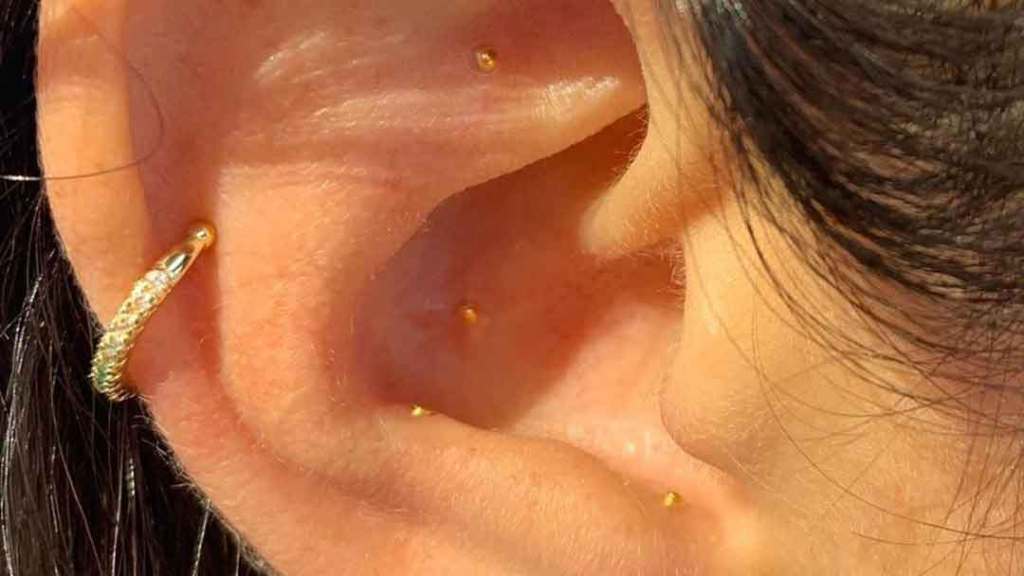The ancient Chinese medicine technique of acupuncture can remedy a variety of ailments.
Through the insertion of needles in various parts of the body, it has the ability to target everything from allergies to chronic pain and period-related symptoms — just to name a few.
Another area of acupuncture, called auriculotherapy, uses ear seeds to stimulate pressure points within the ear to help improve certain conditions.
Ear seeds are tiny metal balls that are secured in different parts of the ear with tape. To reap the benefits of ear seeds, gently apply pressure to them two to three times a day, or when you’re experiencing symptoms. This stimulates the pressure points and helps provide relief.
https://www.instagram.com/p/B5RNlxFpAth/
What are ear seeds used for?
According to acupuncturist, William Kaplanidis, “the ear is like the bottom of your foot in the sense that your whole body is represented on it,” he told Refinery29.
Your ear contains numerous acupuncture points, which are linked to everything from your heart, eyes, lungs and liver.
By placing ear seeds in various parts of your ear, you can target ailments you might be experiencing. In the past, people have turned to ear seeding to help with chronic pain, insomnia, anxiety, depression, stress and migraines.
How do you put them in?
You’re actually able to purchase ear seeds online (you can even buy Swarovski Crystal ear seeds!) and attempt to tape them in yourself. Simply Google “acupuncture points on the ear” and you’ll find heaps of diagrams that show you the various points and what they correlate with.
If you’ve never tried ear seeds before, Kaplanidis told Refinery29 that he recommended heading to a licensed acupuncturist for the first application, as they’ll be able to talk you through the process.
If you do attempt the install by yourself, Healthline suggests using tweezers to correctly place the seeds and never put them in your ear canal. They are only designed for the outside of your ear.
Most of the seeds should fall out by themselves in roughly five days, but if they haven’t, remove the seeds at this time as they can become unsanitary. To safely do this, tilt your ear to the ground and remove. This should stop the seeds falling into your ear canal.
https://www.instagram.com/p/B896O2dJA3y/
What does science say about the effectiveness?
The research in this area isn’t plentiful, so we’re currently working off a handful of small studies. In saying this, most of the results have been positive so far.
Insomnia
Health Direct reports that roughly one third of Australians will experience insomnia at some point in their lives. And if you’ve suffered from sleep issues, you know how much of a drag this can be.
In 2015, a review of studies that looked at the impact of ear seeds on sleep found that it did seem to reduce the symptoms of insomnia. In saying that, the studies were also found to have flaws including the sample size and potential biases.
Despite this, Refinery29 writer Elizabeth Gulino found her experience with ear seeding to be pretty positive. Gulino found that she was “sleeping like a baby, and feeling relaxed and happy to boot.”
But, she also noted that she wasn’t sure whether this was down to the ear seeds, or a myriad of other reasons, including a new mattress and a relaxing weekend spent with friends.
Anxiety
Just like the impact of ear seeding on insomnia, there still needs to be more research undertaken in the area of anxiety.
Anecdotal evidence on the subject is pretty positive. Mindbodygreen writer Alexandra Engler described the effect of ear seeds as similar to “having half a glass of wine or CBD supplement.”
“You’re fully there and present, but perhaps your shoulders have relaxed a bit or you’ve let go of some the tension you didn’t know you were holding,” she wrote.
One study shows that auricular therapy (aka ear seeding) is effective in treating anxiety (after seeing a marked reduction in their participants) and it can ease the symptoms associated, including jaw tension.
Despite this finding, the authors noted that “the mechanisms and evidence for auricular therapy still warrant further study.”
Further research needs to be undertaken in the field of ear seeding, but the handful of studies that do exist have had promising results. While it might not cure your insomnia or anxiety, using ear seeds could help in the overall management of these conditions. As always, talk to your GP about any concerns you might have and only do what works for you.
I’m going to purchase some right now and report back with my review — stay tuned.







